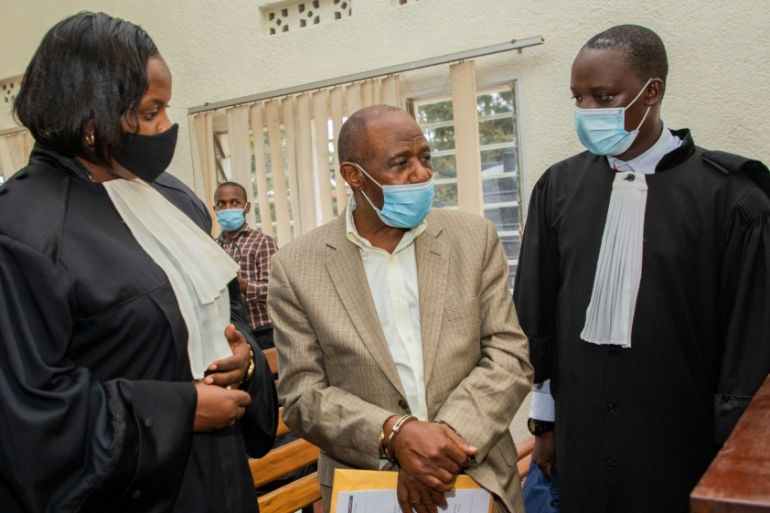Paul Rusesabagina of Hotel Rwanda film denied bail
Rusesabagina is accused of ‘terrorism’ for allegedly founding an anti-government group in the country.

A Kigali court has denied bail to Paul Rusesabagina, whose actions during the 1994 Rwandan genocide inspired the Oscar-nominated film Hotel Rwanda, ahead of his trial on numerous charges including “terrorism”.
Rusesabagina, who has become a high-profile government critic and has been living in exile for years, appeared last month under arrest in Kigali in murky circumstances, with his family alleging he was kidnapped abroad.
Keep reading
list of 4 itemsPaul Kagame: Africans can’t permanently stay in a ‘victim’ position
DRC files second complaint to ICC against Rwanda army, M23 rebels
World leaders descend on Qatar for World Cup 2022 kickoff
Prosecutors on Monday hit him with 13 charges including terrorism, financing and founding rebel groups, murder, arson and conspiracy to involve children in armed groups.
“The court finds that the charges by the prosecution against Rusesabagina are grave and serious,” Judge Dorothy Yankurije said as she blocked his bail request on Thursday.
|
|
“The court ordered that Rusesabagina be detained provisionally for at least 30 days pending his trial.”
Rusesabagina, who had asked to be released to seek medical care, immediately announced he would appeal the decision. He has five days to do so.
The denial of bail further alarmed his family, who along with some human rights and legal groups have expressed concern that his arrest is the latest example of Rwanda targeting critics.
“We have no hope that he can be given fair justice in Rwanda and ask for his immediate release,” his daughter Carine Kanimba said on social media.
The 66-year-old Rusesabagina is a cancer survivor and suffers from a heart condition and hypertension, requiring chronic medication, his family have said previously.
“The health concerns brought by Mr Rusesabagina are baseless since he does not show how being in detention prevents him from accessing all the medical attention he needs,” the judge said.
Movie fame and government criticism
Rusesabagina, who was played by Don Cheadle in the 2004 film in an Oscar-nominated role, has lived abroad since 1996 and holds Belgian citizenship and a US Green Card.
Two observers from the US embassy attended the brief hearing on Thursday.
Rusesabagina became famous as the former manager of a luxury hotel who sheltered hundreds of Tutsis during the genocide in which some 800,000 people – mostly Tutsis but also Hutus – were killed.
For his efforts he was awarded the US Presidential Medal of Freedom.
After the genocide, Rusesabagina – a Hutu – became increasingly critical of President Paul Kagame’s Tutsi-dominated government, accusing his governing party of authoritarianism and anti-Hutu sentiment.
|
|
At home, as Rusesabagina’s fallout with the government grew, so did questions over his heroic tale, with survivors accusing him of profiting off their misery.
He co-founded an opposition group – the Rwandan Movement for Democratic Change (MRCD) – which is said to have an armed wing called the National Liberation Front (FLN).
In multiple speeches, Rusesabagina expressed support for the FLN – which has carried out armed attacks and is described as a terrorist organisation by Rwanda – but the extent of his involvement in its actions is unclear.
In his address to the court on Monday, Rusesabagina denied forming the FLN, saying their actions should be blamed on them alone.
However, he admitted to sending some 20,000 euros ($23,000) to FLN commander Callixte Nsabimana – who is on trial on similar charges – but said this was personal assistance to a friend and not for rebel activities.
‘Forcibly disappeared’
Neither Rusesabagina’s Rwandan lawyers, who have been discounted by his family as state-imposed representation, nor the prosecution have explained the circumstances under which Rusesabagina arrived in Rwanda after he visited Dubai.
The Rwandan court said he was arrested at Kigali International Airport, contradicting the earlier police version that he was arrested through “international cooperation”.
Despite serious concerns about his health and the fact he can’t go nowhere without his passport, my father has been denied bail by a rwandan court. We have no hope that he can be given fair justice in Rwanda and ask for his immediate release. #FreeRusesabagina @freethehero https://t.co/Yz6wrWqn8Y
— Carine Kanimba (@ckanimba) September 17, 2020
Kagame has indicated that Rusesabagina may have been tricked into boarding a private plane in Dubai that took him to Rwanda.
Human Rights Watch last week asserted that Rusesabagina had been “forcibly disappeared,” saying the lack of lawful extradition proceedings suggests Rwandan authorities do not believe their evidence would stand up to independent scrutiny.